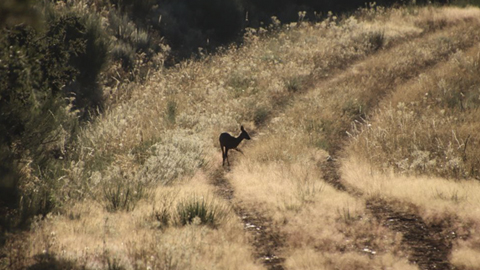New project on the ethical analysis of wildlife regeneration
ICTA-UAB researcher Filka Sekulova is involved in one of the 35 research projects funded through the BBVA Foundation's 2021 call for proposals. The study on the ethics of rewilding in the Anthropocene epoch, entitled “Ètica del rewilding en l’antropocè: comprenent els esculls de regenerar èticament allò salvatge (ERA-CERES)” is led by Cristian Moyano, researcher of the Margarita Salas programme of the Department of Philosophy, and will focus on the advantages and moral challenges derived from renaturalising wildlife to minimise the damage and ethical biases that may come with this method.

Rewilding is becoming a recurring idea within conservation biology and ecology, and it is often presented as a solution to Anthropocene problems such as accelerated climate change, deterioration of ecosystems, loss of biodiversity and damage to global health. “Given the urgency of these challenges, researchers and projects are d on petermined to putting their efforts into promoting this strategy at different scales, particularly through the reintroduction of locally extinct species or by substituting extinct species with other ones. However, there is a lack of studies and critical reflections that ethically analyse finding a balance to this practice”, explains Cristian Moyano. “Not all are advantages or disadvantages. Sometimes, restoring functional ecosystems represents having to choose between controversial compensations. Therefore, there is a need for studies that can reveal the moral tensions created by regeneration practices, to try to conduct conservation practices that are as ethical as possible on all levels, with humans, animals and the environment”, he points out.
The project “Ètica del Rewilding en l’antropocè: comprenent els esculls de regenerar èticament allò salvatge (ERA-CERES)” [Ethics on Rewilding in the Anthropocene: understanding the pitfalls of ethically regenerating what is wild (ERA-CERES)] led by Moyano aims to provide precise public orientation to both experts working on regenerating wildlife and those members of society who reject these methods under epistemological biases or acritical prejudices. The research team has narrowed down five specific objectives with the aim to: study the multiple definitions and semantic plurality related to the concept of rewilding, identify different existing strategies and methodologies existing around these practices, analyse possible legal tensions and moral biases, set down proposals in relation to ethical conflicts, and export and give visibility to the results of the project and share with other expert agents.
Apart from Cristian Moyano, other researchers participating in the project are Marta Tafalla from the UAB Department of Philosophy and Filka Sekulova, post-doc researcher from the Institute for Environmental Science and Technology (ICTA-UAB) and from the UNED. The project also includes the collaboration of researchers from the universities of La Laguna (María José Guerra), Rey Juan Carlos (Fernando Arribas), Murcia (Pablo Serra) and from the international foundation Rewilding Europe (Deli Saavedra).
Cristian Moyano, philosopher and doctor in Environmental Science and Technology from the UAB, is currently post-doc researcher at the same university, while also conducting research at the Institute of Philosophy of the Spanish National Research Council (CSIC), where he studies the ethical challenges of transforming agrarian metabolisms in natural environments to recover the functionality of its ecosystem. He has worked in several research groups studying bioethics, political philosophy and global health, and published many papers on the philosophical impact of anthropocentricism and the environmental and health challenges posed by human development.
The project now being funded has received the maximum amount available in the programme's Philosophy sector, 30,000 euros, and will be conducted over the following 16 months.